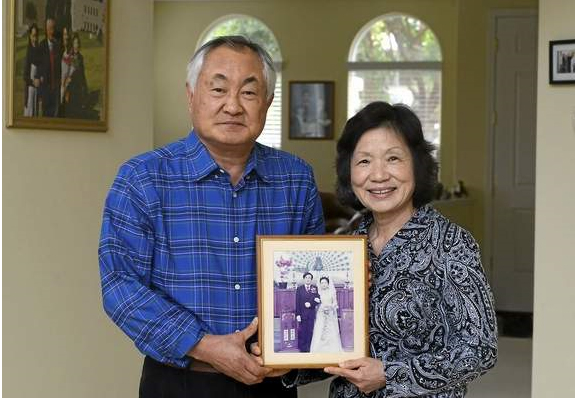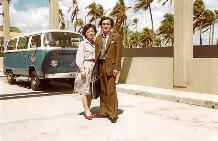
→Brian and Soon Lee hold a photo from their wedding day inside their home in Seaside on Wednesday.
By Dennis Taylor, Monterey Herald
Posted: 12/27/14, 7:27 PM PST |

→ Lee family Soon and Brian Lee, in front of a Volkswagen bus in Los Angeles on their first day in America in 1978.
SEASIDE >> Soon Ko Chung was 27 when she met 30-year-old Brian Byongho Lee at a coffee shop in his hometown of Kwang Ju, South Korea, in 1977. It was a blind date, arranged by his younger sister, and it went well.
Soon was a farmer’s daughter, born poor in 1950 ? the year the Korean War began ? but had managed to rise from the poverty to become a registered nurse at the local university hospital, where Brian worked as a researcher.
“I had heard a rumor that she was a good-hearted person,” says Brian, now 67.
She liked that he was handsome, educated (the son of an elementary school principal), friendly, nice. Coffee progressed to dinner. Dinner was followed by a long walk.
“In Korea, even though you know each other, parents must also say yes, yes, you can marry,” explains Soon, 64. “They say, ‘I hope you will like and love each other. You never separate. You never fight. You have honeymoon life.’ ”
They were married in less than two months. Their honeymoon is entering its 38th year.
Many of their earliest memories are about the strife that plagued Korea during and after the war. Soon recalls surviving on soups made from whatever was available: A potato, perhaps. Vegetables and oatmeal, whenever they were so fortunate. Powdered milk mixed with powdered corn (gifts from the American military, along with C-rations, and ? the rarest of treats ? an occasional chocolate bar).
“We were afraid at first because American soldiers were so big … but also so kind,” she recalls. “And then, when I come to United States, everything big! People big! Dog big! Food big!” They came by plane in 1978 with $500 in their pockets, temporarily leaving their firstborn child, Fred, with relatives. They settled for three years in Los Angeles, at which point Brian learned through his church that the Defense Language Institute needed language instructors. He applied, was hired, and they moved to Monterey the following week.
“Mom passed the test in just three months to become a licensed vocational nurse and worked part time, first in Los Angeles and then here,” says their oldest daughter, Haemy Lee Park. “But because of the language barrier, she had a lot of trouble passing the exam for registered nurse.”
Indeed, Soon took that exam twice a year for eight years ? 16 times ? riding the bus to San Jose or Hayward, usually with her husband and three children, often breast feeding ... and failing each time.
“I remember she’d always be waiting for that envelope. Her stomach would be in knots. She’d be very nervous. And then the mail would come, and she’d open it up very excited and … ugh, failed again,” says Haemy. “Finally, on the 17th try, she passed.” Soon worked the night shift, first at Monterey Pines, and then at Canterbury Woods, where she’s spent the past 23 years. Brian taught days at DLI.
Their work ethic wasn’t lost on their three children, all of whom became outstanding students without much prodding, other than a mandate for perfect attendance. (When their father retired from DLI in August, he was credited with 2,372 hours of unused sick leave.)
Fred attended Stevenson School, where he was first-chair violin in the orchestra, an instrument he learned to play at age 5. He died from liver cancer at age 22.
Haemy, 33, and her sister, Helen Lee Koo, 31, ranked among the top students in their graduating classes at Pacific Grove High. Haemy earned a college degree in psychology and works as a specialist on the Crisis Text Line, counseling youth in crisis. (Two weeks ago, she talked a suicidal teen out of jumping off the Golden Gate Bridge). Helen followed in her mother’s footsteps, got a nursing degree, and became an registered nurse in Southern California.
“Now that I’m a nurse, I can imagine just how challenging it was for my mother to work night shift, full time, and still have the tenacity and enthusiasm to create an extraordinary childhood for her three children,” Helen says. “After her long night shifts, I remember waking up to the sound of my mother’s singing while she pulled open our curtains to start our morning.”
Soon always had breakfast waiting for her children, served with The Herald’s neatly folded comics section. She walked the kids to school, waving goodbye as they crossed the street at Forest and Pine.
A child celebrating a birthday would be honored with a crown made from fresh flowers, with cupcakes and fruit for the entire class at school.
“She drove us to our piano lessons, and our piano teacher crocheted a blanket for her to use while she napped during the lesson,” Helen remembers. “She sacrificed everything for her children.”
She also sacrificed for others, volunteering for charities like Meals on Wheels, donating generously to the Salvation Army, and helping out at Central Presbyterian Korean Church in Pacific Grove, where they’ve been members since 1980.
Their father deserves equal accolades, says Haemy.
“He was a very engaging dad, which is somewhat unusual for Korean men,” she says. “They’re usually not conversational, but we’d have nightly talks and he spent a lot of time with us. We’d always go with him to the grocery store and everybody would be calling out his name ? ‘Mr. Lee! How are you?’ As a little girl, I realized everybody seemed to know who my father was.”
Each summer, Brian would load the family into his Dodge Caravan for a new adventure to places like Yellowstone Park, the Grand Canyon or Butchart Gardens in Victoria, British Columbia.
“He thoroughly enjoyed the long drives with his family all piled together,” Helen says. “And he never once got angry if he had to pull over for one out of five of us to use the bathroom.”
Brian looks forward to publishing a book of his poetry in 2015. Soon has published two books of her essays, including an essay titled “Beautiful Monterey,” which describes the people, animals, coastline and spectacular scenery of the area.
“I imagine beautiful Monterey Bay as the best place to live on earth,” she writes.
Dennis Taylor can be reached at 726-4371.

About the Author
Dennis Taylor